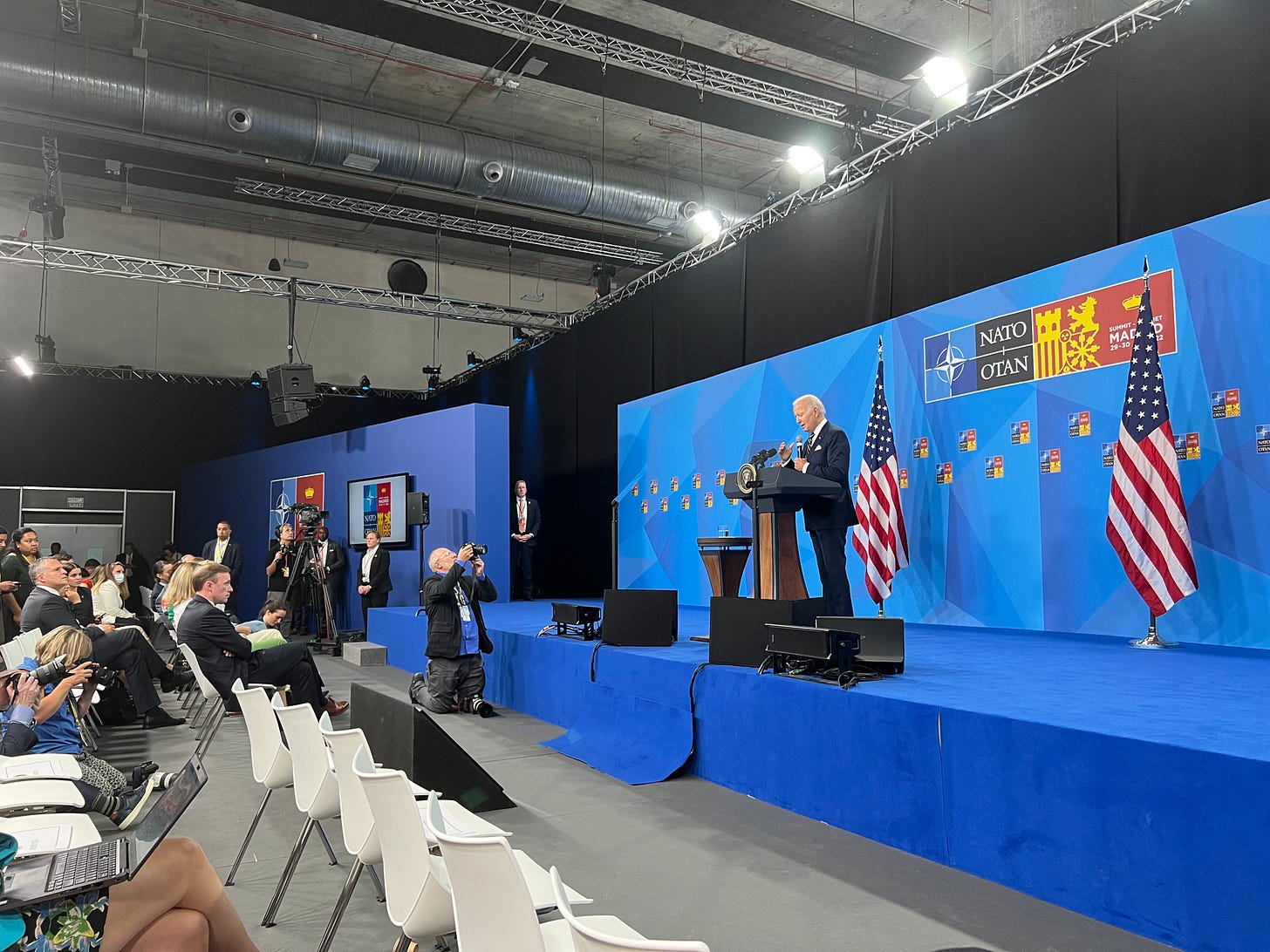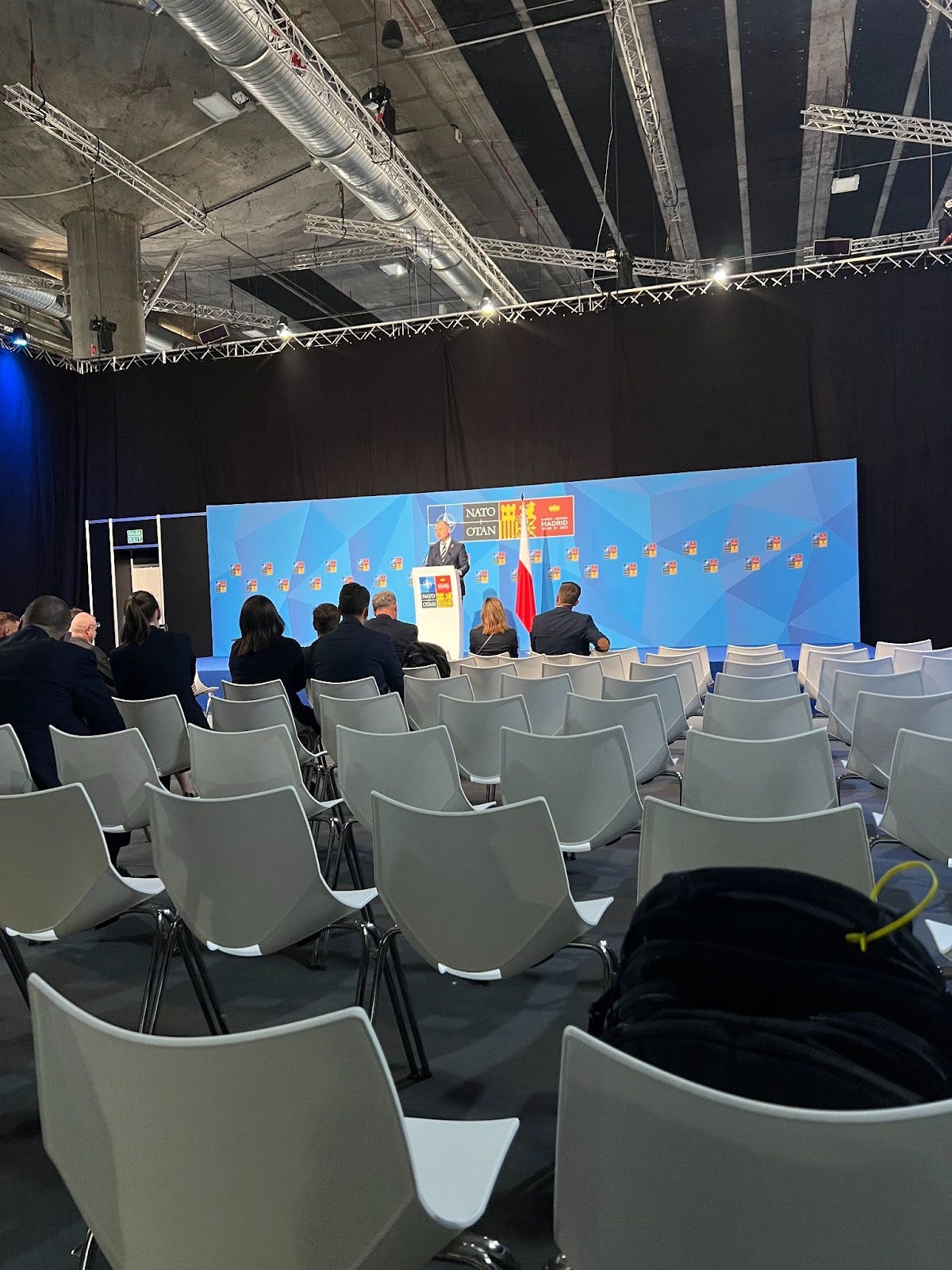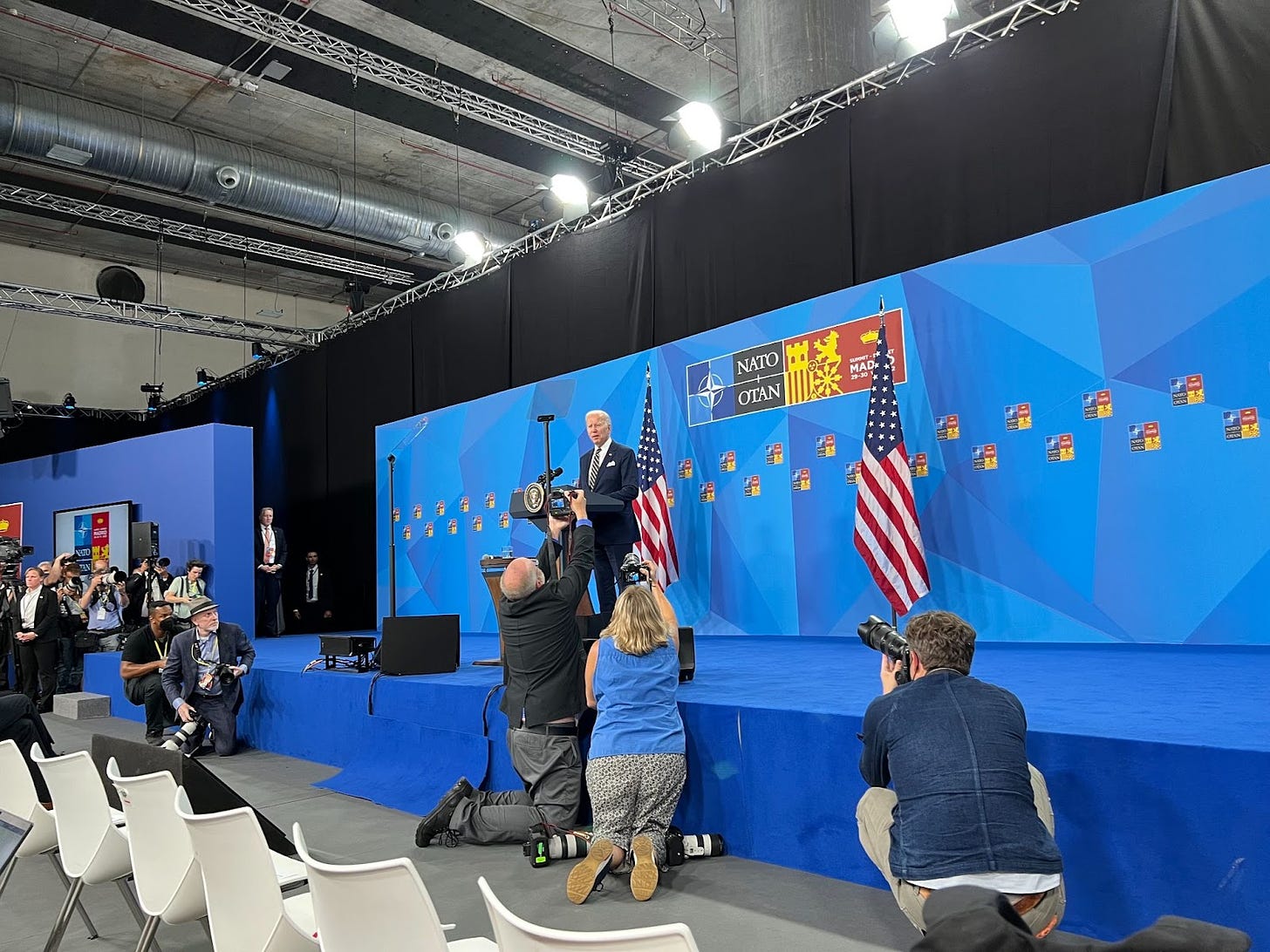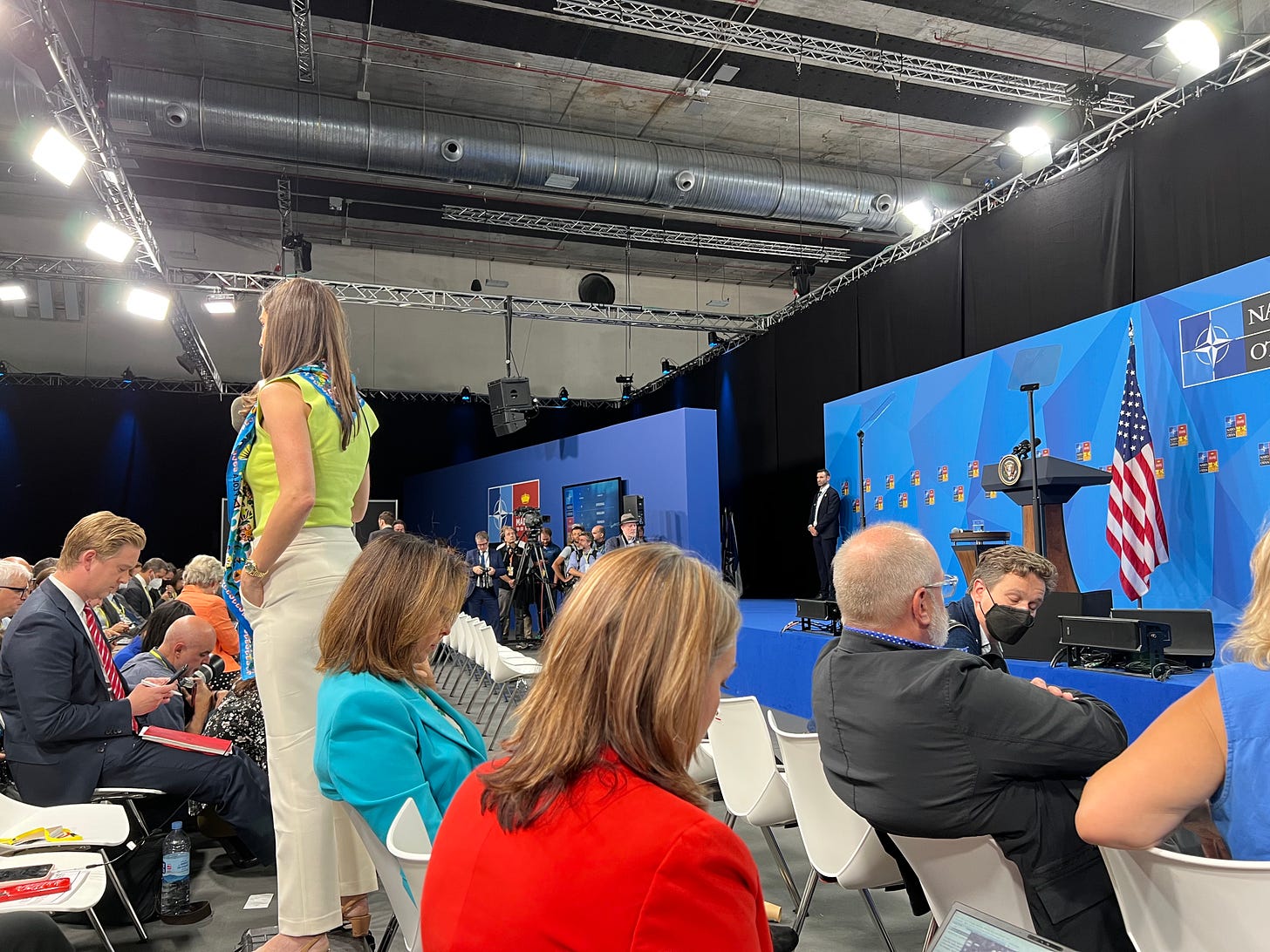
This is the second installment of my “mini series” on the NATO Summit last week, which I was surprisingly and amusingly authorized to attend. The first installment can be found here.
Everywhere you went in the sprawling NATO convention hall, tucked into a nondescript enclave someplace in the northeastern corner of Madrid, there were subtle signs of enduring US primacy. The fact of enduring US primacy within NATO could not be more blindingly obvious to anyone with a lick of common sense, but it’s a fact which must often be tip-toed around given the pretension that NATO is some sort of gloriously egalitarian Alliance — in which 30 member states democratically decide how to ensure their collective security interests.
But back here on Planet Earth, the actual military command structure of NATO is always presided over by a US General — the latest of whom assumed his role just this week, when Gen. Christopher G. Cavoli became NATO’s new “Supreme Allied Commander.” Given that Cavoli ultimately reports to the Commander-in-Chief of the United States military, Joe Biden, the primacy of the US in the core military functions of NATO is one of the Alliance’s fundamental features, though this can be awkward for some European countries (and Canada, lol) to acknowledge amidst their regular flurry of cliches about autonomy and independence. With the formal membership invitation that’s now been extended to Finland and Sweden, each of the 29 other constituent states must formally submit their ratification materials to Washington, DC — not Brussels, the nominal location of NATO HQ.
The ever-present reality of US primacy was further reinforced by the special procedures that were required to attend the big-ticket press conference with Biden at the Summit — procedures that were not required for any other world leader or official, as far as I could discern.
At one point, I had waltzed unknowingly into the press conference of Andrzej Duda, the President of Poland, without so much as a whimpering aide giving me a second look. I would’ve liked to ask Duda a question — Biden had just announced the establishment of a permanent new US military base in Poland, another in a long line of dividends being reaped by the US “defense industry” thanks to the Ukraine war. But Duda’s press conference was conducted entirely in Polish, and there seemed to be no translation devices available; the Polish President had been shunted into a smaller side-room, considerably distant from the shimmering “main event” venue where Biden would later appear.
There was also an occasion on which I unceremoniously walked right past the Prime Minister of Spain, Pedro Sanchez, but I admit I didn’t have my wits about me to formulate an intelligent question during the small window that was suddenly available — in part because my pre-existing knowledge of Spanish foreign policy was lacking. Yet even when I came locked-and-loaded to the press conference of the Prime Minister of the United Kingdom, there were no additional hurdles to be cleared, and I managed to plop down right in front of Boris Johnson.
But in the case of Biden, a summit-wide announcement was made: anyone who wanted to attend his press conference must dutifully line up at a designated booth in the Media Center, hours ahead of time, and present themselves to a State Department operative for secondary admittance procedures. The operative, Jeff Adler, had apparently been siphoned off from his ordinary duties at the US Embassy in Montenegro; it must’ve brought Adler much joy when Montenegro was granted NATO membership back in 2017, as this development would eventually springboard him into the position of carrying out such a weighty task on behalf of the Biden Administration’s PR team. Once you found him, Adler would inspect you, ask a few additional questions, and then if you were lucky, hand over a special pass on top of your regular press credential. At which point you were ordered to line up at another location in advance of Biden’s press conference, and from there you’d finally be shuttled into the “main event” room, which of course was the biggest one in the hall. Somehow I managed to successfully complete this process.
(Speaking of shuttles, the shuttle bus that press were required to ride in order to enter and exit the Summit each day was the only place where face masks were still mandated. The “Policia Nacional” enforced this mandate diligently.)
At the big Biden press conference, “elite” American journalists jealously guarded their preferential seating. Whereas in the Boris Johnson press conference, I easily flouted the putative rule that the first several rows were to be reserved for the Prime Minister’s traveling press corps, the so-called “White House Press Pool” — the exclusive cadre of journalists endowed with the high honor of being able to travel around everywhere with Biden — imposed a hard perimeter to shield themselves from the less-exclusive journalists. So I was reprimanded by a Bloomberg reporter for having taken what he claimed was a specially reserved seat for a colleague from Reuters. If these journalists don’t have much fidelity to the principle of asking incisive questions to powerful officials, they do have fidelity to the principle of ensuring each other’s preferential seating arrangements. Still, I was ultimately able to secure a reasonably advantageous spot, which should’ve been perfectly opportune to ask a question — that is, if this had been a real press conference:
But sadly, this was not a real press conference. Or at least, it was fake in the sense that the aura of the event gives the illusion that any intrepid journalist could be triumphantly called upon to ask a hard-hitting question. However, like his counterpart in the UK, and also the NATO secretary-general, Biden came equipped with a sheet of paper containing a pre-ordained list of journalists he was to draw from, effectively freezing out 99% of media in attendance. So if you figured that Biden might organically field a question or two about the implications of his announcement that another round of “offensive weapons” were being sent to Ukraine — missile systems that can strike targets over 100 miles away, it was reported — you would’ve been sorely mistaken, because of course nobody included on his secret list would’ve dreamt of asking such a question.
Instead, NBC’s Kelly O’Donnell — one of the fortunate few pre-selected journalists, and a valued member of the White House Press Pool — decided to ask the following question to Biden:
“Can you describe for us, sir, many Americans are grappling with this. What is your sense today about the integrity and the impartiality of the Supreme Court? Should Americans have confidence in the Court as an institution? And your views on abortion have evolved in your public life. Are you the best messenger to carry this forward?”
That’s right, NBC News paid for Kelly O’Donnell’s travel, hotel, and expenses — all the way to an international Summit in Spain — so that she could ask a question that had absolutely nothing to do with the issues under discussion at the Summit. Far more important was for her to ask a totally generic question about an irrelevant US political issue, in hopes of generating a saucy soundbite to be played on the Today Show or wherever. If there’s a better illustration of the embarrassing myopia of the “elite” US media, I’d like to see it.
I asked O’Donnell afterwards if she or NBC had taken any action ahead of time to arrange for her to be called upon, and she denied having done this. But really, she almost didn’t have to do anything: she’s already in the esteemed “White House Press Pool,” and whatever staff are involved in crafting Biden’s pre-approved lists already know that she’s reliably superficial enough that whatever question she might ask would be acceptably banal.
Meanwhile, the alleged significance of this NATO Summit could not have been advertised in more grandiloquent terms; it was almost presented as though the future of Civilization as we know it was on the line in Madrid. And who knows, maybe that could really be true: the much-touted Strategy Decree issued by NATO, which outlines the US-led military priorities for the entire 30-country Alliance, declares that the member states will henceforth “collectively deliver the full range of forces, capabilities, plans, resources, assets and infrastructure” needed for “high-intensity, multi-domain warfighting against nuclear-armed peer-competitors.” If you can parse the jargon, that means NATO is currently preparing to wage nuclear war against Russia and China. And yet here’s Kelly O’Donnell, asking about US abortion policy — having paid zero attention to what actually occurred at this supposedly vital Summit she’d been dispatched to cover. Or if she did pay attention, she lacks the basic competence to grasp any of the germane details.
I was sitting right near O’Donnell in the press conference; she was chatting away with Nancy Cordes of CBS and Kaitlin Collins of CNN about how wearing a certain color of clothing might cause them to stand out and thus be called upon — apparently under the illusion that Biden’s press conference would involve him actually calling spontaneously on journalists with their hands raised. Donald Trump had often done this, they recalled, but with Biden it was not to be.
CNN’s Kaitlan Collins also apparently believed it was extraordinarily important for her to stand propped up on some sort of metallic box in the middle of the press conference room — the only media member at the Summit with the “cojones” to pull this stunt, at least as far as I observed. In order to maintain the proper TV shot for Collins’ extremely informative journalistic endeavor, a CNN producer was ostentatiously crawling around on the floor, shooing aside anyone who might’ve gotten in the way and interrupted their sacrosanct camera angle.
In what must have come as a devastating shock, Collins was not included on the pre-ordained Biden list — CNN didn’t make the cut of the grand total of five outlets which received the honor: AP, NYT, Bloomberg, WSJ, NBC. But after Biden left the stage, Collins maximized the theatricality of her presence by shouting out trite, soundbite-ready questions regarding Brittney Griner, the WNBA basketball player currently in custody in Russia. Biden was not even within ear-shot when she was shouting these questions, but the fact of her shouting them presumably made for great TV.
And so it was foretold that Biden, the military leader of an Alliance that’s allegedly defending the frontlines of Democracy in Ukraine — and is furthermore encroaching into the “Indo-Pacific” region in preparation for a future confrontation with China — took five questions from five different US media outlets, and then was out the door. This is supposed to be an International Summit, hence the attendance of journalists from all over the world, but the idea of taking a single question from a non-American outlet was apparently inconceivable to the Biden PR team. Some found this decision infuriating enough that even a generally by-the-books journalist, David Herszenhorn of POLITICO Europe, fumed that Biden’s conduct was a “disgrace”:

As for the question I would’ve asked, here’s an approximation:
“Presidents throughout history from Woodrow Wilson, to Lyndon Johnson, to Barack Obama have pledged to NOT send US troops into certain foreign conflicts, only to then do so. You’ve repeatedly made this pledge with respect to Ukraine. But at the same time, you’ve also called for regime change in Russia, demanded Putin be put on trial for war crimes, and ignored any prospect of a diplomatic resolution to the conflict. Isn’t your announcement today of yet more ‘offensive weapons’ for Ukraine — along with NATO’s new decree binding together Russia with China as enemy targets — making more likely the very scenario you’ve pledged to avoid, that is, the deployment of US troops into a theater of combat? Also, can you confirm the recent New York Times report that CIA officers and NATO commandos are already ‘on the ground’ in Ukraine?”
Again, this question clearly would’ve been too hot for Madrid.
During the Biden press conference, White House operatives such as National Security Advisor Jake Sullivan, Press Secretary Karine Jean-Pierre, and “Coordinator for Strategic Communications” John Kirby were seated in the front row — but they too immediately scurried out the instant Biden completed his remarks, expertly avoiding even the remotest possibility that they might endure an unscripted interaction with a media member. Not like such interactions would have been much of a headache anyway, as the operatives probably would’ve gotten a random NBC-style question about the Supreme Court that reflected no knowledge on the journalist’s part beyond bog-standard awareness of the transient US news cycle.
Having attended back-to-back press conferences with Boris Johnson and Joe Biden, there is one preliminary conclusion I can draw about the respective nature of the UK and US “elite” press corps. Both countries’ delegations tend to be roughly equivalent in their insularity and obnoxious “insider” disposition. But the US journalists, it has to be said, just come across as substantially dumber. Ideology aside, in order to ascend to a position in UK media where you’re afforded the opportunity to directly question the Prime Minister, at some point you probably have to exhibit the quality of being moderately “clever.” Whereas the American journalists — and especially the TV journalists — often seem to lack in basic cognitive aptitude, such that it’s unclear they’d even be capable of having any kind of substantive exchange with a prominent public official. Maybe that’s because they’re just innately dumb, or maybe it’s because they expend so much of their mental reserves on the pointlessly theatrical aspects of the job, such as coordinating their ridiculous “stand-up shots” for the glistening TV cameras.
Whatever the explanation for their inanity, it really must be observed up-close to fully appreciate why the US media, particularly in the domain of foreign policy, is so mind-bendingly bad.
The next installment in this “mini series” will cover, among other things, my unexpected interaction with the President of Turkey, plus the subsequent attacks leveled at me by Security State content-producers such as alleged journalist Julia Macfarlane. Subscribe!






"Maybe that’s because they’re just innately dumb, or maybe it’s because they expend so much of their mental reserves on the pointlessly theatrical aspects of the job, such as coordinating their ridiculous “stand-up shots” for the glistening TV cameras."
There was a popular Washington adage in the Watergate era that still fits Washington activity. "An ounce of facade is worth a pound of substance." All that's left after decades is the facade.
"But the US journalists, it has to be said, just come across as substantially dumber."
I'll admit ... I laughed out loud when I read this. Thanks, as always, for saying the things our pompous, uninformed, elite and supremely ignorant 'media' fail to see about themselves.